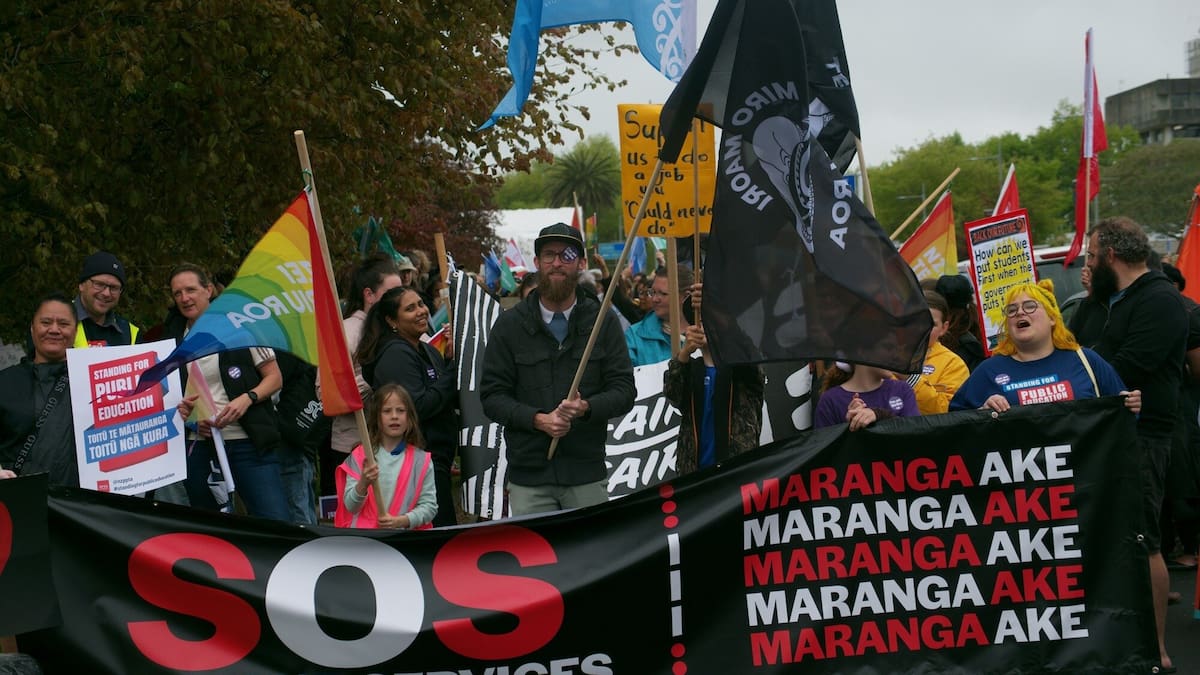She said she had participated in strikes several times over the years, but the circumstances leading to Thursday’s strike had been “the worst time we’ve had”, she told the Herald.
Hamilton East School teachers Sarah (left), Georgia Cox-Wright and Yoshie. Photo / Tom Eley
“The Government aren’t listening … they’re not going to plan, and they’re not paying fair.”
Tamara said she felt “horrible” after work every day, but in her view, seeing “nurses being degraded [and] undervalued” was worse.
“You watch your registered nurses struggling to do the work that they’re out there to do, looking after a ratio of patients where they have nine on an afternoon shift.
“That’s so dangerous. Anything can happen, and they [the Government] don’t care about that. That’s the message we’re getting from the Government,” she said.
Kelly, who has been a registered nurse for four years, said she felt “underappreciated and overworked”.
“You feel like there’s more that needed to be done [during the shifts], but you just didn’t have the time to do it,” she said.
“Some days you go home and you just have to do things to switch off your mind.”
Like many other public sector workers, Kelly said she regularly had to endure abuse from the public.
“We get abused on the daily and there’s no support for that. We’ve been in situations where I’ve walked away from things and [said] ‘that was overwhelming … I need to take a few days for myself to process and to get over that’.”
Tamara said the mega-strike showed “the whole sector is struggling”.
“Us being together as a group … is showing, why are they treating our services like this?” she said.
“We are frontline workers.”
New Zealand Nurses Organisation members at the mega-strike in Hamilton. Photo / Tom Eley
Another protester was Hamilton East School teacher Georgia Cox-Wright, who has been teaching for 30 years, and said, “We feel empowered to be on strike, but we are p***ed off at this Government and sick of them undervaluing teachers.”
Cox-Wright said she regularly felt exhausted from her job, even when off-duty.
“It’s like our job changes minute by minute, they keep changing the curriculums on us.
“They tell us to implement a new curriculum and then they change what [that] looks like again.
“Curriculums [should] listen to what teachers on the ground are doing.
“We can’t keep up with sliding floors … all we want is the best for our kids.”
First-year teacher Sarah said she joined the field “at a tough time”.
“I want to help children and be a positive voice for change, but we also have to be doing this [strike], this is not okay.”
Another teacher, Rhonda, said education shouldn’t be “a political issue” but she felt the Government was making it one.
“If all parties agreed on a road for education, then we wouldn’t be doing this.”
Teachers at the mega-strike in Hamilton. Photo / Tom Eley
Fleur Fitzsimons, national secretary of the Public Service Association (PSA), said it was now up to the Government to avoid further strikes.
”These disputes can be settled. But the PSA will ballot members for further strike action if the offers are not improved.”
Ahead of the strike, Public Service Minister Judith Collins released an open letter to anyone who would be impacted by the strikes, saying the Government has acted in good faith and met with unions’ demands for pay increases in line with inflation.
“We value all public sector employees,” she wrote.
Collins said the Government had a responsibility to manage the country’s finances carefully, especially when “money is tight”, she said.
“From cancer drugs to social housing, from support for vulnerable people to conversation initiatives, there are thousands of appeals for increased spending as well as for wage increases.
“The country is simply not earning enough to meet all these calls.”
Collins said it was “only unions who want strikes”.
“We ask, once again, for them to come to the table. That is the place to talk and to bargain.”
Malisha Kumar is a multimedia journalist based in Hamilton. She joined the Waikato Herald in 2023 after working for Radio 1XX in Whakatāne.

